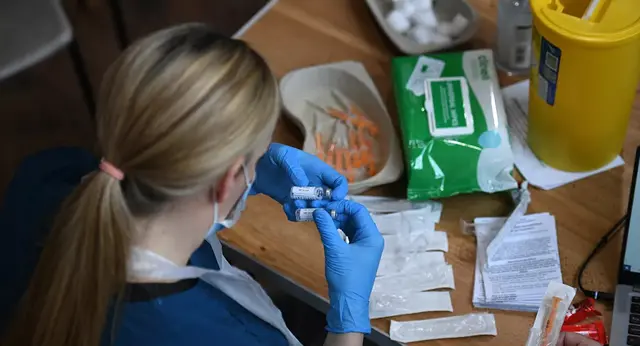Last week, Dominic Raab rejected European Council President Charles Michel's accusations that Britain had imposed "an outright ban" on the export of coronavirus vaccines or vaccine components produced in the UK.
British Foreign Secretary Dominic Raab has accused the European Commission of brinkmanship following its threat to block exports of COVID-19 vaccines to the UK.
On Wednesday, European Commission President Ursula von der Leyen made it clear that the EU is prepared to halt vaccine exports to Britain unless the bloc gets its "fair share" of shots from the UK.
Raab told Reuters on Thursday that he thinks the commission's move "takes some explaining because the world's watching", adding the decision "also cuts across the direct assurances that we had from the commission".
"We expect those assurances and legal, contracted supply to be respected", the foreign secretary underscored, referring to European Commission Vice President Valdis Dombrovskis and EU Foreign Policy Chief Josep Borrell.
Raab said the UK government was "reliably informed" that Dombrovskis and Borrell "weren't aware of any plans to restrict lawfully contracted [vaccine] supply to the UK".
"Frankly, I'm surprised we're having this conversation. It is normally what the UK and EU team up on to reject when other countries with less democratic views than our own engage in that kind of brinkmanship", the foreign secretary added.
He was echoed by the UK prime minister's official spokesman who underscored that "putting in place restrictions endangers global efforts" to tackle the COVID-19 pandemic.
The remarks followed Ursula von der Leyen stating that she was no longer prepared for EU-made COVID vaccines to be exported to Britain and other countries that were quicker rolling out their own vaccination programmes.
"It is hard to explain to our citizens why vaccines produced in the EU are going to other countries that are also producing vaccines, while hardly anything is coming back. All options are on the table. We are in the crisis of the century and I'm not ruling out anything because we have to make sure Europeans are vaccinated as soon as possible", she pointed out.
She spoke as Reuters cited an unnamed European Commission source as saying that Dombrovskis earlier urged the British government "to provide figures on its exports of vaccines to the EU, which we [the commission] look forward to receiving".
The source asserted that the EU had already exported 10 million vaccine doses to Britain, but had received none in return.
Johnson Rejects Accusations of UK Vaccine Export Ban
Last week, UK Prime Minister Boris Johnson lashed out at the EU over its allegations that Britain had banned vaccine exports, insisting that his country has "not blocked the export of a single COVID-19 vaccine or vaccine components".
"This pandemic has put us all on the same side in the battle for global health, we oppose vaccine nationalism in all its forms", Johnson stressed.
He added that Britain should be "proud" of the success of its vaccine rollout so far, as well as the £548 million ($760 million) that London had invested in the COVAX initiative for fairer international distribution of the vaccine.
The UK kicked off its nationwide vaccination campaign on 8 December, with more than 20 million UK nationals already having received a vaccine. Those first in line to receive the shot were senior citizens aged 70 and over, health and care workers, and people with extreme underlying conditions
Johnson's statement was preceded by European Council President Charles Michel accusing the UK of imposing "an outright ban on the export of [coronavirus] vaccines or vaccine components produced" on British territory.
He also rejected accusations of "vaccine nationalism" against the EU after the bloc faced criticism for its vaccine rollout, noting that he was "shocked" by such charges.
The current exchange between the EU and the UK comes as a number of European countries, including France, Germany, Italy, Denmark, and the Netherlands, suspended inoculations with the AstraZeneca vaccine amid reports of blood clotting as one of the drug's side effects.
(SPUTNIK)
 简体中文
简体中文

